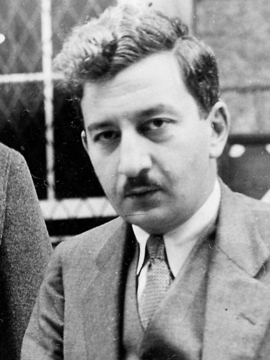Bernard Ades facts for kids
Quick facts for kids
Bernard Ades
|
|
|---|---|

Ades in 1933
|
|
| Born | July 3, 1903 Baltimore, Maryland, U.S.
|
| Died | May 27, 1986 (aged 82) |
| Occupation | Lawyer |
| Spouse(s) | Mary Ethel Hechler Dora Rubinfine Ziebel |
| Children | 2 |
| Military Career | |
| Allegiance | |
| Service/ |
|
| Rank | First Lieutenant |
| Unit | The "Abraham Lincoln" XV International Brigade |
| Battles/wars | Spanish Civil War |
Bernard Ades (born July 3, 1903 – died May 27, 1986) was an American lawyer. He is best known for defending Euel Lee, an African American man accused of a serious crime in Maryland in 1931. At a time when "Jim Crow" laws caused a lot of unfairness, Ades helped set important new rules. He fought for the right to move trials away from prejudiced areas. He also worked to allow African Americans to serve on juries.
Contents
Bernard Ades: A Champion for Justice
Early Life and Education
Bernard Ades was born in Baltimore, Maryland. He was the second child of Harry and Fanny Levine Ades. His father was a traditional Jew from Russia. He started an umbrella business with his brother. Bernard's family background and his later beliefs led to him being watched closely by the government.
Ades went to Baltimore City College for high school. He then studied law at the University of Maryland Law School. Later, he earned a degree in economics from Johns Hopkins University.
Fighting for Fair Trials
Bernard Ades was part of the Communist Party. This influenced the types of legal cases he chose. In 1931, he worked for the International Labor Defense. This group was linked to the Communist Party. They were fighting against unfair treatment and violence.
The Euel Lee Case
Ades represented Euel Lee, also known as Orphan Jones. Lee was an African American farmhand. He was accused of a serious crime against a white family. This happened because he was supposedly not paid his full wages. The case took place in Maryland's Eastern Shore. This area was still heavily affected by Jim Crow Laws. These laws caused a lot of unfair treatment.
Ades used new methods to try and get a fair trial. This made him unpopular in Maryland. He even faced danger and was attacked once.
A Landmark Defense
Ades won some important victories for his client. He got the trial moved to a different location. He also secured two new trials. Most importantly, he won the right for African Americans to be on jury panels. Even though Ades lost the trial and Lee faced the highest penalty in 1933, his defense was very important. His actions set new rules that were used later in the civil rights movement.
After the trial, there was a disagreement over Lee's body. Ades wanted to bury Euel Lee in New York. This was because Lee had stated it in his last will. However, authorities feared unrest. Ades was not allowed to bury the body in New York. Lee is now buried in an unmarked grave in Brooklyn, Maryland.
Ades faced criticism for his actions in the case. He was defended by Charles Houston and Thurgood Marshall of the NAACP. This was a significant moment. It was one of the first times a white man was defended in court by an African American lawyer. The Maryland Bar publicly criticized Ades. But they also praised his strong defense of Lee. This case helped establish that organizations could provide legal help to individuals. This was important for groups like the NAACP in later civil rights cases.
Political Aspirations
In 1934, Ades ran for Governor of Maryland. He ran on the Communist Party ticket. He received less than 8,000 votes. Despite support from the African American community, he lost by a large amount.
Volunteering in Spain
On February 20, 1937, Ades traveled to Spain. He joined the Spanish Civil War on the side of the Loyalists. He became a First Lieutenant. He served as a Company Commissar in the Lincoln Brigade. This brigade was part of the International Brigades. These were volunteer groups fighting against fascism. He fought in several battles, including Brunete and Fuentes de Ebro. He returned to the United States on September 30, 1937.
Later Life and Legacy
After returning home, Ades worked as an auditor for the Federal Housing Authority. In 1941, he was identified as a Communist by a Congressman. He was forced to resign. He was also placed on a list for security detention.
In 1941, New York State certified Ades as a Public Accountant. He worked from an office in New York City. His clients included Our World magazine and the Communist Party. He also worked for other smaller left-wing groups.
Ades was active in local politics in the Bronx. He was a delegate to the New York State Constitutional Convention. He was against the war in Vietnam. He took part in marches against it. He also helped start a movement to oppose the president in the Bronx.
The FBI watched Ades from 1940 until 1979. He died in a nursing home in 1986. He was buried in Baltimore, Maryland.
Personal Life
Bernard Ades's first marriage ended. In 1935, he married Mary Ethel Hechler. She was also a Communist Party member. They had two daughters, Janet and Judith. Mary passed away in 1959. He then married Dora Rubinfine Ziebel, who passed away before him.
"Red Father" Documentary
"Red Father" is a documentary film. It was directed by Tova Beck-Friedman. The film explores Bernard Ades's life through the eyes of his daughter, Janet. She admired his wisdom and kindness. As a child, she thought he was a hero. As an adult, she questioned his beliefs and his involvement with Communism. Even through difficult times, Ades stayed true to his ideals.

